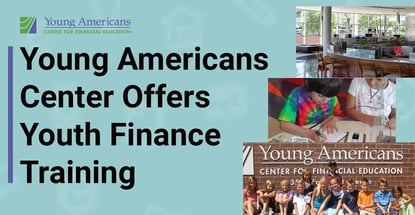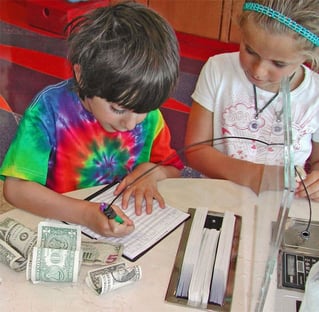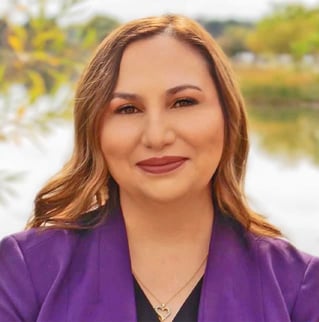
Our experts and industry insiders blog the latest news, studies and current events from inside the credit card industry. Our articles follow strict editorial guidelines.
In a Nutshell: Parents looking for an immersive introduction into banking and finance for their kids can find it through the Young Americans Center for Financial Education (YACFE). Using hands-on education and real-life experiences, YACFE aims to enhance financial literacy for young people up to age 22. The banking arm of the organization allows young people to open accounts they manage themselves from deposits to credit cards with a controlled spend limit. The center also provides several programs that let youths experience finance in realistic scenarios.
Studies show that many adults in the US lack financial education with only 57% of American adults considered financially literate, according to Standard & Poor’s Global Financial Literacy Survey.
That’s why it’s no surprise that youths are not receiving an adequate education in matters of banking and personal finances. A lack of basic personal finance skills can contribute to poor money management. As a result, many young people start out their lives with student loan debt, credit card bills, and other financial constraints.
It only highlights the importance of giving young people a proper financial education before they enter their 20s and begin to make many critical fiscal decisions. While it is imperative for schools to tackle this subject and offer students more financial knowledge, it also requires the support of parents and even outside resources.
To help fill this gap, other institutions and learning centers are trying to make up for what some school curricula seriously lack. One major organization that has been assisting youths in the state of Colorado is the Young Americans Center for Financial Education (YACFE), which functions as both a bank and a learning center.

The organization and its offshoot programs started with the Young Americans Bank (YAB) in 1987 and was inspired by Bill Daniels, a cable television executive. After reading that a group of elementary students from Denver were denied a loan for a school project from other banks, Daniels established a bank for young people.
YAB is a fully functioning bank that caters specifically to youths and is designed to teach them the basics of banking so they learn to independently manage their accounts.
Victoria Aragon, Vice President of Banking at the Young Americans Bank, said that at the time, there was no financial literacy available in the area and there was nothing to help kids learn to be financially successful.
“[Daniels] was passionate about making sure that we could teach them, but the only way to really teach them is to give them a fully functioning bank,” said Aragon.
After the bank began its operations, the main organization was fully fleshed out through the creation of the learning center in 1988. Since then, the Young Americans Center has developed a number of successful programs, including Young AmeriTowne, International Towne, and YouthBiz. YACFE also provides young people field trip opportunities and online learning.
Young AmeriTowne operates as an immersive learning experience where youths get to role play in a miniature town assigning various occupations to the participants. That’s just one of the many hand-on ways that YACFE gives kids a chance to learn about money management.
Immersive Banking For Kids
The Young Americans Bank offers youths ages zero to 22 a truly unique experience. To help them learn banking skills and independence, YAB allows them to manage their own accounts with parental oversight.
YAB currently has two physical locations where it offers young people checking and savings accounts, CDs and even credit cards with a $100 limit. The bank will let youths open a checking account at the age of 10, and they can apply for a credit card at 12 with a cosigner.
Once young people graduate from the program, YAB will send them a letter of recognition and congratulate them on becoming a “senior citizen.” From there, the program helps transition them to a larger bank.
YAB also offers youths business accounts and business lending for up to $1,000 to help them get started with a business. Of course, they do need a cosigner but the loans and credit cards function just like those available to adults.

“We really hold onto that process to make sure the payments are being made on time — making sure they understand how this is a tool to help build their credit and not to get them into debt,” said Aragon.
YAB walks kids through the whole process from filling out deposit slips to online account management. The young people are also taught how to detect online fraud to fully have them prepare for whatever may occur.
Since the program is designed as an educational tool, YAB takes a demonstrative approach to banking. If young customers overdraw from their accounts by a couple dollars, Aragon and her team will decide whether to charge a fee. But most of the time, they don’t because it’s more about the learning.
“We make sure we don’t have any monthly service charges for the kids because we’re not trying to charge them. And we’re definitely not a profit-based bank. It’s all about teaching,” said Aragon.
One thing to keep in mind is that while YAB provides online banking, potential customers need to open an account at one of the physical branches. “The reason for that is we really want to make sure that we’re meeting with those kids and explaining everything throughout the whole process,” said Aragon.
Young AmeriTowne and Other Programs
Aside from its banking services, the Young Americans Center provides fun and highly interactive activities that allow youths to gain firsthand experience in personal finance.
One of YACFE’s top programs is Young AmeriTowne. Students who participate in the program assume job roles like mayor, bank teller, radio broadcaster and other essential positions within a community. And they all role play while making various daily exchanges.

“Every kid gets a debit card when they start with a certain amount of money loaded on it, and there is a mock ATM set up throughout town so they can check their bank accounts when they go in the shops and make their purchases,” said Aragon.
Young AmeriTowne is set up in coordination with teachers and focuses on students in fourth through sixth grades. The organization’s headquarters houses two Young AmeriTownes, and YACFE will sometimes arrange temporary Young AmeriTowne locations at community centers, elementary schools or libraries.
After kids reach middle school age, they can participate in International Towne. The program gives older kids a chance to get involved in job responsibilities within a global economics framework. International Towne teaches concepts like international business, trade, currency exchange, and diplomacy.
Some other programs YACFE offers include YouthBiz, which caters to middle and high school students who have a passion for business and are interested in becoming entrepreneurs.
The program holds a competition every year for young business owners called “Spotlight on YouthBiz Stars,” which awards cash prizes and educational scholarships.
“It just gives them this maturity and confidence that they may not normally have because they know they have the backing and they’ve been able to experience it at such a young age,” said Aragon.
The Young Americans Center also offers field trips, summer camps, and workshops that teach kids how to produce their own goods and operate businesses.
Helping Youths Start On The Right Financial Path
While online financial education resources provide a relatively low-cost and accessible way for young people to learn about money management, it requires effort on the kid’s part to be responsible and diligent in following the course material.
Understanding through a screen how financial literacy relates to the real world can be hard. The best way to learn is through real experience and understanding how finance relates to our daily lives.
This type of immersive learning is what inspired the Young Americans Center to take a direct approach to education. Aragon said it’s really about teaching the youths to be more independent.
“There’s a lot of places out there that have prepaid debit cards that the parents have full control of. Here, the parents have some control over it, but it really is kid-driven,” she said.
It also inspires kids to start considering entrepreneurship at an earlier age and get a head start on their business careers. “I think our kids do end up more entrepreneurial because of it since we have those resources and when they walk in the bank, they see the whole building,” said Aragon. “They learn all about our youth programs and our marketplaces before they come into the bank, and they’re interested in that.”
By giving youths a sense of how it feels to be an adult and do grown-up things, the bank allows them to have a working knowledge of personal finances before going out into the world and be completely on their own.
It makes a lot of sense because parents have to explain things to their kids on a daily basis, and there’s no reason to keep financial matters out of the discussion. Participation is essential in every aspect of a young person’s life, and it should extend to financial education as well.




![12 Best Credit Cards For Young Adults ([updated_month_year]) 12 Best Credit Cards For Young Adults ([updated_month_year])](https://www.cardrates.com/images/uploads/2022/03/Best-Credit-Cards-For-Young-Adults.jpg?width=158&height=120&fit=crop)
![7 Best Credit Cards for Young Professionals ([updated_month_year]) 7 Best Credit Cards for Young Professionals ([updated_month_year])](https://www.cardrates.com/images/uploads/2019/06/Best-Credit-Cards-for-Young-Professionals-Feat-1.jpg?width=158&height=120&fit=crop)
![12 Best Credit Cards for Young Travelers ([updated_month_year]) 12 Best Credit Cards for Young Travelers ([updated_month_year])](https://www.cardrates.com/images/uploads/2019/06/Best-Credit-Cards-for-Young-Travelers-Feat.jpg?width=158&height=120&fit=crop)
![7 Best Credit Cards For Young Adults ([updated_month_year]) 7 Best Credit Cards For Young Adults ([updated_month_year])](https://www.cardrates.com/images/uploads/2021/03/Best-Credit-Cards-For-Young-Adults.jpg?width=158&height=120&fit=crop)

